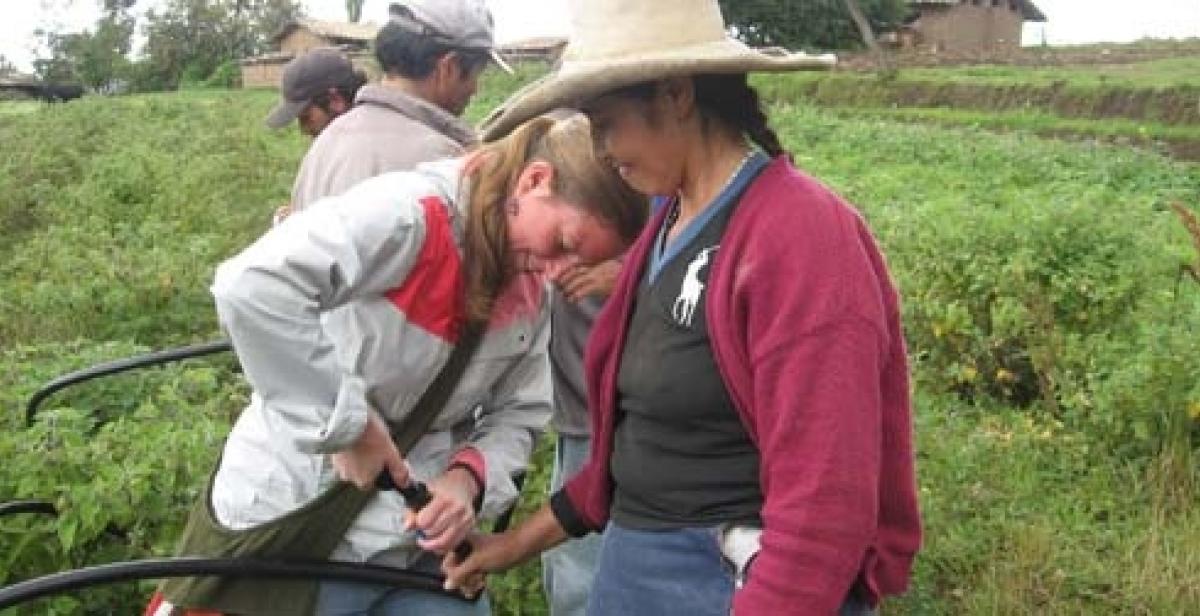Sonja is a Dutch development worker, currently working as a specialist in water management with Grupo GEA in Peru. She previously worked as a specialist in intercultural management at the Ideas Centre (Centro Ideas) in Cajamarca, Peru.
What is your work background?
After working in water management in various parts of the world, I fell in love with Peru when I was doing a research Project in the Andes in the south of the country for my Master’s thesis on Water and Risk Management. After finishing my studies in Holland, I returned to Peru to work as a volunteer for a Belgian NGO, supporting irrigation user organisations. When I finished working there, I applied for my first placement with Progressio.
What inspired you to become a development worker with Progressio?
Firstly, I was very interested in the placement. My first Progressio placement involved supporting the intercultural and gender objectives of projects related to the conservation of biodiversity for a local NGO in the north of the country. Although the subject matter was not directly related to water, I have always been interested in the social aspects and work with rural communities.
Furthermore, this type of work is very interesting and rewarding, particularly when you manage to reach an understanding and have a dialogue with the communities, which starts a process of mutual learning.
Lastly, I feel that the work that I can do here in Peru is in some ways more urgent and more important that the kind of work that I could do in my home country.
I have recently started my second placement with Progressio, this time in Lima. I am involved in the management of a water resource system, with the aim of improving the quality and quantity of water in Lima’s rivers. Although I am not working directly with the rural communities, I still really enjoy it, because I am back in my subject area – the management of water - and because of the involvement with different stakeholders, such as communities, businesses, NGOs and municipalities.
What has had the biggest impact on you in your placement country? Is living in your placement country as you expected it to be?
Discovering the huge range of ecosystems in Peru and the cultures connected to them had a big impact on me. The country is naturally and culturally very rich, but this is threatened by a number of processes, such as mining, globalisation and climate change.
I had no idea of what living in Peru was like before I came, but now I have been here for nearly four years and I am still very happy here.
What do you enjoy most about your role?
Knowing that I can really make an impact, although it may be small, on improving the quality and quantity of water in Lima, which is very urgent, given that Lima is a megacity in a desert and also has serious problems of contamination and climate change.
What has been the most exciting moment so far?
The most emotional moment was during my first development placement. The most emotional moment was during my first development placement. I was a patron/ special guest at a country school ceremony to celebrate graduating from primary school in the community where my NGO had worked for many years. My colleague and I were the guests of honour at a graduation party. From speaking with local people at the party, I realised the value of the NGO’s work and the bond between us and the community.
And the most important lesson?
That things often don’t turn out as you want them to, but this does not mean that they have turned out badly; it’s simply a question of changing your ideas and expectations.
Since you started your placement, what is the biggest change that you’ve seen?
As I have recently started this placement, I haven’t yet seen a visible impact on the quality and quantity of water, but in my opinion the biggest impact so far is the interest that some of the major actors in our project have shown, such as the municipality of Lima, the drinking water company and some very large commercial businesses. This tells us that what the work we are doing is important and necessary.
What is the biggest challenge facing the area in which you are working?
Making all water users aware of the water issue, so they understand that it is a resource that may one day run out and that it should be protected for future generations.
If you could change one thing, what would that be?
I would change the water contamination that is caused by the mines in the high parts of the rivers. It causes serious contamination that affects the ecosystem and the people who are dependent on this water resource.
What strikes you most about Progressio’s Development Worker model?
The opportunity to learn and teach at the same time. I am learning about a new culture, new ways of working, new situations and at the same time I am able to offer a lot from my culture and my point of view. It is a perfect exchange.
What advice would you give to someone who is thinking about becoming a development worker?
That if you have a flexible approach, commitment, tolerance, and a positive attitude, you will have a very interesting and rewarding experience.
Where do you see yourself once you have finished your placement?
I would like to stay in Peru or in another country in Latin America. The experience of working for Progressio has given me a clearer idea of what I want in life and what is really important to me. I have learnt a lot over the last few years, both on a personal and a professional level.



